| |||||||||||||||||||||||||||||
All 88 seats of the Landtag of Brandenburg 45 seats needed for a majority | |||||||||||||||||||||||||||||
|---|---|---|---|---|---|---|---|---|---|---|---|---|---|---|---|---|---|---|---|---|---|---|---|---|---|---|---|---|---|
| |||||||||||||||||||||||||||||
| |||||||||||||||||||||||||||||
The next election to the Landtag of Brandenburg is scheduled for 22 September 2024.
| |||||||||||||||||||||||||||||
All 88 seats of the Landtag of Brandenburg 45 seats needed for a majority | |||||||||||||||||||||||||||||
|---|---|---|---|---|---|---|---|---|---|---|---|---|---|---|---|---|---|---|---|---|---|---|---|---|---|---|---|---|---|
| |||||||||||||||||||||||||||||
| |||||||||||||||||||||||||||||
The next election to the Landtag of Brandenburg is scheduled for 22 September 2024.
The 2019 Brandenburg state election resulted in the formation of the Third Woidke cabinet; a Kenya coalition of the SPD, CDU, and Greens. [1] The SPD became the strongest party with small losses, just ahead of the AfD, which gained many votes. The CDU lost significantly and fell from second to third place. Die Linke also lost significantly and ended up behind the Greens. Brandenburg United Civic Movements/Free Voters remained in state parliament with 5.0 percent. The FDP missed out with just 4.1 percent.
In the 2021 German federal election, the Social Democratic Party won all 10 constituencies across the state.
| Polling firm | Fieldwork date | Sample size | SPD | AfD | CDU | Grüne | Linke | BVB/FW | FDP | BSW | Others | Lead |
|---|---|---|---|---|---|---|---|---|---|---|---|---|
| Infratest dimap | 4–8 Apr 2024 | 1,161 | 22 | 26 | 18 | 8 | 6 | 3 | – | 10 | 7 | 4 |
| Wahlkreisprognose | 28 Mar – 7 Apr 2024 | 1,100 | 21 | 27 | 15 | 7 | 5.5 | 5.5 | 2 | 9.5 | 7.5 | 6 |
| INSA | 14–22 Mar 2024 | 1,000 | 19 | 25 | 19 | 8 | 7 | 4 | 3 | 12 | 3 | 6 |
| INSA | 8–15 Jan 2024 | 1,000 | 17 | 28 | 18 | 8 | 6 | 4 | 3 | 13 | 3 | 10 |
| Forsa | 6–10 Jan 2024 | 1,007 | 22 | 32 | 16 | 7 | 6 | 5 | 3 | 4 | 5 | 10 |
| INSA | 13–22 Nov 2023 | 1,000 | 20 | 27 | 18 | 8 | 6 | 3 | 3 | 11 | 4 | 7 |
| Wahlkreisprognose | 24 Oct–1 Nov 2023 | 1,017 | 27 | 32 | 13.5 | 6.5 | 7 | 6 | 2.5 | – | 5.5 | 5 |
| 21.5 | 22 | 12 | 4.5 | 5 | 4 | 2.5 | 21.5 | 7 | 0.5 | |||
| Infratest dimap | 8–11 Sep 2023 | 1,160 | 20 | 32 | 18 | 8 | 8 | 6 | 4 | – | 4 | 12 |
| Wahlkreisprognose | 10–14 Aug 2023 | 1,003 | 25 | 30 | 15 | 7 | 8 | 7 | 2 | – | 6 | 5 |
| 22 | 22 | 13 | 6.5 | 5.5 | 5 | 2 | 19.5 | 4.5 | Tie | |||
| INSA | 26 Jun–3 Jul 2023 | 1,000 | 21 | 28 | 18 | 9 | 10 | 5 | 3 | – | 6 | 7 |
| IFM | 22 May–1 Jun 2023 | 1,000 | 24 | 24 | 17 | 10 | 12 | 8 | 4 | – | 2 | Tie |
| Infratest dimap | 19–24 Apr 2023 | 1,200 | 22 | 23 | 23 | 9 | 7 | 5 | 5 | – | 6 | Tie |
| INSA | 27 Mar–4 Apr 2023 | 1,000 | 21 | 25 | 19 | 10 | 10 | 5 | 4 | – | 6 | 4 |
| Wahlkreisprognose | 7–13 Mar 2023 | 978 | 23.5 | 26 | 17 | 9 | 8 | 6.5 | 3 | – | 7 | 2.5 |
| pmg – policy matters | 28 Nov–15 Dec 2022 | 1,011 | 27 | 23 | 17 | 7 | 9 | 5 | 6 | – | 6 | 4 |
| Wahlkreisprognose | 6–18 Nov 2022 | 1,922 | 26 | 26 | 13.5 | 10 | 8 | 7 | 3.5 | – | 6 | Tie |
| INSA | 4–10 Oct 2022 | 1,000 | 22 | 25 | 17 | 11 | 10 | 5 | 4 | – | 6 | 3 |
| Infratest dimap | 22–26 Sep 2022 | 1,165 | 24 | 24 | 18 | 11 | 9 | 4 | 4 | – | 6 | Tie |
| Wahlkreisprognose | 4–11 Sep 2022 | 1,100 | 26.5 | 25 | 12 | 12 | 6 | 7 | 5 | – | 6.5 | 1.5 |
| Wahlkreisprognose | 9–17 May 2022 | 1,001 | 30 | 19 | 16 | 13 | 6 | 6 | 4.5 | – | 5.5 | 11 |
| Infratest dimap | 21–24 Apr 2022 | 1,182 | 30 | 19 | 18 | 10 | 7 | 4 | 6 | – | 3 | 11 |
| Wahlkreisprognose | 21–29 Mar 2022 | 1,002 | 29 | 20 | 15 | 11 | 6 | 8 | 5 | – | 6 | 9 |
| Forsa | 9–17 Dec 2021 | 1,008 | 28 | 17 | 14 | 11 | 11 | 8 | 6 | – | 5 | 11 |
| Wahlkreisprognose | 8–16 Dec 2021 | 1,040 | 34 | 19 | 10 | 9 | 7 | 8 | 7 | – | 6 | 15 |
| Wahlkreisprognose | 7–14 Oct 2021 | 980 | 32 | 19.5 | 9 | 9.5 | 7 | 9.5 | 7 | – | 6.5 | 12.5 |
| 2021 federal election | 26 Sep 2021 | – | 29.5 | 18.1 | 15.3 | 9.0 | 8.5 | – | 9.3 | – | 10.3 | 11.4 |
| Infratest dimap | 25–30 Aug 2021 | 1,157 | 34 | 17 | 13 | 8 | 9 | 7 | 7 | – | 5 | 17 |
| Infratest dimap | 12–15 May 2021 | 1,183 | 23 | 18 | 16 | 16 | 11 | 4 | 7 | – | 5 | 5 |
| Wahlkreisprognose | 7–13 May 2021 | – | 22 | 18 | 14 | 19 | 9 | 8 | 5 | – | 5 | 3 |
| Wahlkreisprognose | 12–19 Mar 2021 | – | 24 | 18 | 14 | 14 | 10.5 | 9 | 5 | – | 5.5 | 6 |
| Forsa | 10–15 Dec 2020 | 1,001 | 23 | 16 | 20 | 15 | 12 | 6 | 4 | – | 4 | 7 |
| Infratest dimap | 12–17 Nov 2020 | 1,002 | 26 | 19 | 20 | 12 | 11 | 3 | 5 | – | 4 | 7 |
| Wahlkreisprognose | 30 Sep–7 Oct 2020 | 1,089 | 23 | 19 | 17 | 13.5 | 12.5 | 7.5 | 2 | – | 5.5 | 4 |
| INSA | 29 Sep–6 Oct 2020 | 1,043 | 21 | 20 | 17 | 16 | 13 | 5 | 4 | – | 4 | 1 |
| Wahlkreisprognose | 19–27 Aug 2020 | – | 26 | 16.5 | 19 | 11 | 12 | 7 | 3 | – | 5.5 | 7 |
| Wahlkreisprognose | 12–19 Jun 2020 | – | 28 | 16 | 22 | 10 | 10 | 7 | 3 | – | 4 | 6 |
| Wahlkreisprognose | 4–11 May 2020 | – | 29.5 | 20 | 23 | 7.5 | 7.5 | 4 | 4 | – | 4.5 | 6.5 |
| Wahlkreisprognose | 3–8 Apr 2020 | – | 28 | 21 | 20.5 | 8 | 8 | 6 | 3 | – | 5.5 | 7 |
| Infratest dimap | 31 Mar–4 Apr 2020 | 1,000 | 27 | 20 | 19 | 12 | 11 | 3 | 4 | – | 4 | 7 |
| Forsa | 20–25 Feb 2020 | 1,001 | 22 | 18 | 14 | 15 | 15 | 7 | 3 | – | 6 | 4 |
| Infratest dimap | 11–16 Nov 2019 | 1,000 | 25 | 22 | 14 | 12 | 12 | 5 | 5 | – | 5 | 1 |
| 2019 state election | 1 Sep 2019 | – | 26.2 | 23.5 | 15.6 | 10.8 | 10.7 | 5.0 | 4.1 | – | 4.1 | 2.7 |

The Free Democratic Party is a liberal political party in Germany.

Alliance 90/The Greens, often simply referred to as the Greens, is a green political party in Germany. It was formed in 1993 by the merger of The Greens and Alliance 90. The Greens had itself merged with the East German Green Party after German reunification in 1990.
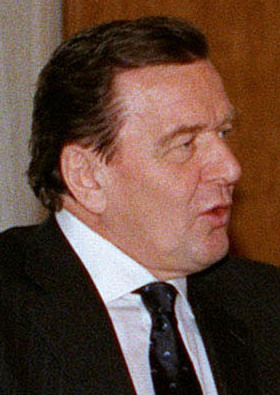
Federal elections were held in Germany on 27 September 1998 to elect the members of the 14th Bundestag. The Social Democratic Party (SPD) emerged as the largest faction in parliament for the first time since 1972, with its leader Gerhard Schröder becoming chancellor. The Christian Democrats had their worst election result since 1949.

Federal elections were held in Germany on 16 October 1994 to elect the members of the 13th Bundestag. The CDU/CSU alliance led by Helmut Kohl remained the largest faction in parliament, with Kohl remaining Chancellor in a narrowly re-elected coalition with the Free Democratic Party (FDP). This elected Bundestag was the largest in history until 2017, numbering 672 members.

Federal elections were held in Germany on 18 September 2005 to elect the members of the 16th Bundestag. The snap election was called after the government's defeat in the North Rhine-Westphalia state election, which caused them to intentionally lose a motion of confidence to trigger an early federal election. The outgoing government was a coalition of the centre-left Social Democratic Party of Germany (SPD) and Alliance 90/The Greens, led by federal Chancellor Gerhard Schröder. The election was originally intended for the autumn of 2006.
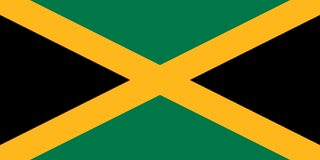
Jamaica coalition is a term in German politics describing a governing coalition among the parties of the Christian Democratic Union/Christian Social Union (CDU/CSU), Free Democratic Party (FDP), and the Green Party.
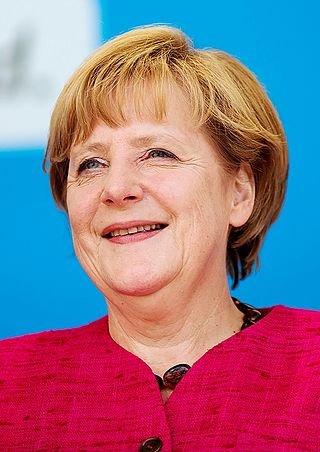
Federal elections were held on 22 September to elect the members of the 18th Bundestag of Germany. At stake were all 598 seats to the Bundestag, plus 33 overhang seats determined thereafter. The Christian Democratic Union of Germany/Christian Social Union of Bavaria (CDU/CSU) of incumbent chancellor Angela Merkel won their best result since 1990 with nearly 42% of the vote and nearly 50% of the seats, just five short for an overall majority. The Free Democratic Party (FDP) failed to meet the 5% vote electoral threshold in what was their worst showing ever in a federal election, denying them seats in the Bundestag for the first time in their history.

The 2009 Brandenburg state election was held on 27 September 2009 to elect the members of the 5th Landtag of Brandenburg. It took place on the same day as the 2009 federal election and 2009 Schleswig-Holstein state election. The incumbent government of the Social Democratic Party (SPD) and Christian Democratic Union (CDU) led by Minister-President Matthias Platzeck took small losses, but retained a majority. However, the SPD chose to form a government with The Left rather than continue the SPD–CDU coalition.

Federal elections were held in Germany on 24 September 2017 to elect the members of the 19th Bundestag. At stake were at least 598 seats in the Bundestag, as well as 111 overhang and leveling seats determined thereafter.

The 2018 Hessian state election was held on 28 October 2018 to elect the members of the Landtag of Hesse. The outgoing government was a coalition of the Christian Democratic Union (CDU) and The Greens led by Minister-President Volker Bouffier.

The second Müller senate was the state government of Berlin between 2016 and 2021, sworn in on 8 December 2016 after Michael Müller was elected as Governing Mayor by the members of the Abgeordnetenhaus of Berlin. It was the 27th Senate of Berlin.

The 2019 Brandenburg state election was held on 1 September 2019 to elect the members of the 7th Landtag of Brandenburg. It took place on the same day as the 2019 Saxony state election. The outgoing government was a coalition of the Social Democratic Party (SPD) and The Left, led by Minister-President Dietmar Woidke.

The 2019 Thuringian state election was held on 27 October 2019 to elect the members of the 7th Landtag of Thuringia. The outgoing government was a coalition consisting of The Left, the Social Democratic Party (SPD), and The Greens, led by Minister-President Bodo Ramelow.

The 2021 Berlin state election, ruled invalid in 2022 and repeated in 2023, was held on 26 September 2021, on the same day as the 2021 German federal election, which also had to be repeated in parts of Berlin due to irregularities. Thus, the 19th Abgeordnetenhaus of Berlin was elected twice.

The 2021 Rhineland-Palatinate state election was held on 14 March 2021 to elect the 18th Landtag of Rhineland-Palatinate. The outgoing government was a "traffic light coalition" of the Social Democratic Party (SPD), Free Democratic Party (FDP), and The Greens led by Minister-President Malu Dreyer.

Bettina Jarasch is a German politician of Alliance 90/The Greens who served as Deputy Mayor and Senator for Environment, Mobility, Consumer and Climate Protection in the Berlin state government from December 2021 to April 2023. She has been a member of the Abgeordnetenhaus of Berlin from 2016 to 2021 and again since 2023, as well as leader of the Berlin branch of the Greens from 2011 to 2016. She was the Greens' lead candidate for the 2021 Berlin state election and again for the 2023 Berlin repeat state election.
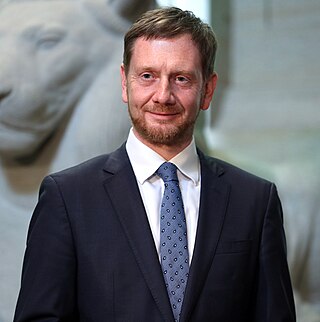
The Second Kretschmer cabinet is the current state government of Saxony, sworn in on 20 December 2019 after Michael Kretschmer was elected as Minister-President of Saxony by the members of the Landtag of Saxony. It is the 10th Cabinet of Saxony.

The Third Woidke cabinet is the current state government of Brandenburg, sworn in on 20 November 2019 after Dietmar Woidke was elected as Minister-President of Brandenburg by the members of the Landtag of Brandenburg. It is the 9th Cabinet of Brandenburg.
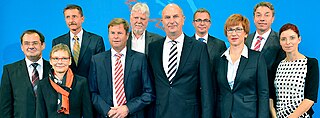
The Second Woidke cabinet was the state government of Brandenburg between 2014 and 2019, sworn in on 5 November 2014 after Dietmar Woidke was elected as Minister-President of Brandenburg by the members of the Landtag of Brandenburg. It was the 8th Cabinet of Brandenburg.
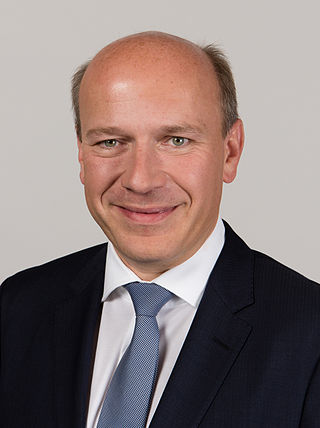
The 2023 Berlin repeat state election was held on 12 February 2023 to once again elect the 19th Abgeordnetenhaus of Berlin as the 2021 Berlin state election held on 26 September 2021 was declared invalid due to irregularities. Also affected were parts of the 2021 German federal election in Berlin, these were repeated on 11 February 2024.